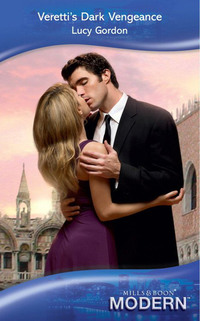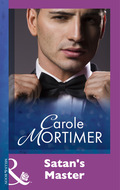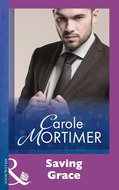Książki nie można pobrać jako pliku, ale można ją czytać w naszej aplikacji lub online na stronie.
Czytaj książkę: «Veretti's Dark Vengeance»
‘Goodnight, signora, and thank you for a lovely evening,’ Salvatore said.
‘Wh-what did you say?’
‘I said goodnight. I think we both know the time isn’t right.’
‘What do you mean by that?’ Helena demanded.
Salvatore spoke softly. ‘I mean that when I’m ready to make love to you, I won’t go to your room with the world watching.’
‘When you— How dare you? You arrogant swine! Are you fooling yourself that I’m waiting on your pleasure?’ she exclaimed.
‘I’m not fooling myself, but perhaps you are. The decision has already been taken for both of us. It’s only a question of when.’
Lucy Gordon cut her writing teeth on magazine journalism, interviewing many of the world’s most interesting men, including Warren Beatty, Richard Chamberlain, Roger Moore, Sir Alec Guinness and Sir John Gielgud. She also camped out with lions in Africa, and had many other unusual experiences which have often provided the background for her books. She is married to a Venetian, whom she met while on holiday in Venice. They got engaged within two days.
Two of her books have won the Romance Writers of America RITA® award, SONG OF THE LORELEI in 1990, and HIS BROTHER’S CHILD in 1998, in the Best Traditional Romance category. You can visit her website at www.lucy-gordon.com
VERETTI’S DARK VENGEANCE
BY
LUCY GORDON
MILLS & BOON
Before you start reading, why not sign up?
Thank you for downloading this Mills & Boon book. If you want to hear about exclusive discounts, special offers and competitions, sign up to our email newsletter today!
Or simply visit
Mills & Boon emails are completely free to receive and you can unsubscribe at any time via the link in any email we send you.
CHAPTER ONE
‘SHE’LL be punished for what she’s done. I’m going to make sure of that if it takes me the rest of my days!’
Salvatore Veretti took one last look of loathing at the photograph in his hand before pushing back his chair and going to stand by the window overlooking the Venetian lagoon, where the morning sun was clear, brightening the deep blue sky, adding glitter to the tiny waves that laughed and curled against the boats.
He stood here every morning, relishing the beauty of Venice, bracing himself for the day ahead. There was money to be made, critics to be silenced, enemies to be defeated by one method or another. But there was also this moment of peace and beauty, and the strength it gave him.
Beauty. The thought brought his attention back to the photograph. It showed a woman, not merely lovely but physically perfect: tall, slender, exquisitely proportioned. Any man would say so, for this was a body carefully tended to please men, to be judged by men.
Salvatore, well-equipped to judge the female form, having had so many of them naked in his bed, had studied this one carefully before letting his hatred explode from him. Now he looked at it again, estimating its many beauties, and nodding as though what he saw was no more than he had expected.
But there was no softening in his coldly handsome features. If anything they grew harsher as his eyes roved over the glorious shape that was barely covered by the minute black bikini; the lush breasts, the endless legs, the shapely rear.
Calculation, he thought. Every inch carefully sculpted, every move assessed beforehand, everything planned to inflame male desire and, by that means, bring her money. And now she had the money she’d schemed to get. Or thought she had.
But I too can calculate, he mused. As you are about to discover. And when your weapons prove useless against me—what will you do then?
There was a buzz from the desk and his secretary’s voice said, ‘Signor Raffano is here.’
‘Send him in.’
Raffano was his financial adviser and also an old friend who’d known the family through many troubles. He’d been summoned to Salvatore’s office in the Palazzo Veretti to discuss urgent business. By the time he entered Salvatore had moved away from the window.
‘There’s more news,’ Salvatore said curtly, waving the other man to a chair.
Raffano was elderly with white hair and a gentle face. In his youth he’d been flamboyant, but the passing years had left him thinner and more serious.
‘You mean in addition to your cousin’s death?’ he enquired cautiously.
‘Antonio was my father’s cousin, not mine,’ Salvatore reminded him. ‘He was always a bit of a gadfly, likely to do stupid things without considering the consequences.’
‘He was known as a man who liked to enjoy himself,’ Raffano mused. ‘People said it proved him a true Venetian.’
‘That’s a slur on all Venetians. There aren’t many with his reckless disregard for everything except his own pleasures. He’d spend it, drink it or sleep with it, and to hell with the rest of the world.’
‘I will admit he should have taken more responsibility for the glass factory.’
‘Instead he put the whole thing in his manager’s hands, and vanished into the distance, to have fun,’ Salvatore said grimly.
‘Probably the shrewdest thing he could have done. Emilio is a brilliant manager, and I doubt if Antonio could ever have run the place so well himself. Let’s remember the best of him. He was popular and he’ll be greatly missed. Will his body be coming home for burial?’ Raffano asked.
‘No, I gather the funeral has already taken place in Miami, where he lived these last two years,’ Salvatore said. ‘It is his widow who will be coming to Venice.’
‘His widow?’ Raffano queried. ‘But was he—?’
‘It seems that he was. Recently he bought the company of a flighty piece, no different from many others who had been in his life. I’ve no doubt he paid her well, but she wanted more. She wanted marriage so that in due course she could inherit his fortune.’
‘You judge people very harshly, Salvatore. You always did.’
‘And I’m right.’
‘You know nothing about this woman.’
‘I know this.’ With a sharp movement Salvatore pushed the photograph over the table.
Raffano whistled as he took it. ‘This is her? Are you sure? It’s impossible to see her face.’
‘No, it’s a pity about that huge sun hat, but what does the face matter? Look at the body.’
‘A body to burn a man up with desire,’ Raffano agreed. ‘How did you get this?’
‘A mutual friend happened to bump into them a couple of years ago. I believe they’d just met, and my friend took a quick snap and sent it to me with a note saying this was Antonio’s latest “little fancy”.’
‘You can just see that they must have been on the beach,’ Raffano said.
‘The perfect setting for her,’ Salvatore said wryly. ‘How else could she flaunt her expensive charms? Then she whisked him off to Miami, and when she had him to herself she persuaded him to marry her.’
‘When did the marriage take place?’
‘I don’t know. No word of it reached here, which was probably her doing. She must have known that if his family knew about the wedding they’d have put a stop to it.’
‘I wonder how,’ Raffano pointed out. ‘Antonio was in his sixties, not a teenager to obey your orders.’
‘I’d have stopped it, I promise you. There are ways.’
‘Legal ways? Civilised ways?’ Raffano asked, giving him a curious look.
‘Effective ways,’ Salvatore said with a harsh grin. ‘Trust me for that.’
‘To be sure. I would always trust you to do what was unscrupulous.’
‘How well you know me! However, the wedding took place. It must have been at the last minute, when she saw that he was near the end and moved fast to secure an inheritance.’
‘Are you sure there’s been a marriage at all?’
‘Yes, I’ve heard from her lawyers. The Signora Helena Veretti—as she now calls herself—is about to arrive and claim what she considers hers.’
The coldly sardonic edge in his voice startled even Raffano, who was used to it.
‘Of course you feel bad about it,’ he said. ‘The factory should never have been left to Antonio in the first place. It was always understood that it was to go to your father—’
‘But my father was busy getting into debt at the time and my great-aunt thought she was doing the sensible thing, leaving it to Antonio,’ Salvatore supplied. ‘That was all right. He was family. But this woman isn’t family, and I’ll be damned if I stand by and see Veretti property fall into her grasping hands.’
‘It’ll be hard for you to challenge the will if she’s his legal wife, however recent the marriage.’
A frightening smile came over Salvatore’s face.
‘Don’t worry,’ he said. ‘As you said, I know how to be unscrupulous.’
‘You make it sound almost like a virtue.’
‘It can be.’
‘Just the same, be a little careful, Salvatore. I know you’ve had to be ruthless ever since you were very young, to save your family from disaster. But sometimes I wonder if you’re going a little too far for your own good.’
‘My own good? How can being firm possibly harm me?’
‘By turning you into a tyrant, a man to be feared but never loved, and consequently a man who will end his days alone. I wouldn’t say this unless I was your friend.’
Salvatore’s face softened. ‘I know that,’ he said. ‘A better friend no man ever had. But don’t worry. I’m well-protected. Nothing can touch me.’
‘I know. That’s what worries me most.’
Everything was done. The funeral was over, the paperwork was in order, and all that was left was to check out of the hotel and head for Miami Airport.
Before starting the journey Helena went to the cemetery, to lay a final offering of flowers on her husband’s grave.
‘I guess this is goodbye,’ she said when she’d arranged them carefully. ‘I’ll come back and see you again, but I don’t know exactly when. It depends what I find when I get to Venice.’
A step on the path behind her made her turn far enough to see a group of people walking past, slowing so that they could see her better. She gave a faint smile.
‘It’s happening again,’ she whispered to Antonio. ‘Do you remember how we used to laugh when they stared at me?’
Her beauty had always drawn eyes, first in her years as a model then, after her retirement, the attention had continued. Her long hair was a luscious honey-colour, and her figure had remained perfect; five feet ten inches, slender but rounded.
Her face was remarkable, with large eyes and full lips that commanded attention. Those generous lips were her chief beauty for they made her smile impossible to ignore, and when held softly together they seemed to be on the verge of a kiss.
That, at least, was what one of her admirers had said. Helena had thanked him graciously, then turned away to hide her chuckles. She could never quite take her own achievements seriously, which was part of her charm. Photographers wanting to convey ‘voluptuous’ had always asked for her, and she was soon known in the trade as ‘Helen of Troy’, which made her laugh even more.
Antonio had enjoyed every moment of it.
‘They look at us and say, “What a lucky fellow to have won the heart of that beautiful woman!”’ he’d said with relish. ‘They think what a wonderful time we must have in bed, and they envy me.’
Then he’d sighed, for the wonderful time in bed had been an illusion. His heart had been too weak to risk physical exertion, and in their two years together they had never once made love. But he’d derived much innocent pleasure from the world’s speculation.
‘I’m going to miss you terribly,’ she told him now. ‘You were wonderful to me, always so kind, giving much and taking little. With most men it’s the other way around. For the first time in my life I felt loved and protected, and now suddenly I’m alone again.’
Tears streamed down her face as she touched the marble headstone.
‘Why did you have to die? We always knew it was going to happen but we thought, if we were careful, we could prolong your life. And we did. You had all those extra months and things were looking good, but then suddenly…’
She could still see him as he’d been then, laughing, then stopping suddenly, his face becoming strained, laughter turning to choking as he was enveloped by his final heart attack. And it was all over.
‘Goodbye,’ she whispered. ‘You’ll always be in my heart.’
They had been so close in spirit that she felt he was still with her as the cab conveyed her to Miami Airport and she boarded the flight. In the long dark hours crossing the ocean he was there again, reminding her how their strange marriage had come about.
She’d abandoned modelling at the height of her career, tired of the life, meaning to become a businesswoman. She’d built up a healthy fortune, and only needed a way to invest it.
She’d thought herself knowledgeable, but soon discovered her mistake when a con man persuaded her to invest in a dud company. Before she’d actually signed any cheques Antonio had come to her rescue, warning her of a friend who’d been tricked in just such a way. That was how they’d met, when he saved her from disaster.
They’d become close friends. He had been in his sixties and already knew that his life could not be long. When he’d asked her to stay with him until the end she agreed without hesitation, feeling that he would ease her loneliness for whatever time they had together, as she would ease his. Their marriage ceremony had been as quiet as they could arrange and she’d tended him lovingly until the day he died in her arms.
He’d talked quite frankly about the time to come, and the provision he’d made for her, excessive provision in her opinion. She’d known he owned a glass factory on the Venetian island of Murano.
‘When I’m no longer here Larezzo Glass will be yours,’ he said. ‘And you will go to Venice to claim it.’
‘But what would I do with a glass factory?’ she’d protested.
‘Sell it. My relative, Salvatore, will make you a good offer.’
‘How can you be so sure?’
‘Because I know how badly he wants it. He wasn’t pleased when it was left to me instead of him.’
‘But didn’t you tell me that he already has one of his own?’
‘Yes, Perroni Glass is his, and they’re the two best. When he owns Larezzo as well he’ll dominate the whole industry. Nobody will be able to challenge him, which is just how he likes it. You can demand a high price. There’s a bank loan to be paid off but there’ll be enough money left after that to keep you safe. Don’t refuse me, cara. Let me have the pleasure of knowing that I’ve looked after you, as you have looked after me.’
‘But I don’t need money,’ she reminded him. ‘I have plenty of my own, which you saved for me. You looked after me very effectively then.’
‘Then let me look after you some more, to thank you for your care of me.’
‘But we cared for each other,’ she thought now. ‘He showed me that all men aren’t grasping and rapacious. Now he’s gone and I can’t see the way ahead.’
It was a long journey, first across the Atlantic to Paris, then a three-hour wait for the connecting flight to Venice. By the time she reached her destination she was nodding off. When she finally emerged from Customs she was met by an escort from the hotel. It was bliss to leave everything to him.
She had a vague awareness of the motor-boat trip across the lagoon and down the Grand Canal to the Illyria Hotel, where hands assisted her from the boat. Once in her room she nibbled at the meal that was sent up, before climbing into bed and sinking into a heavy, jet-lagged sleep.
As the hours passed her sleep became lighter and she found that Antonio was there again in her dreams, cheerful, jokey, despite his impending death, because it was his way to ignore the future as long as he could enjoy the present.
Because he flourished in hot weather they had gone to live in Miami, where they spent long, lazy days together, in contented mutual devotion. To please him she’d learned to speak Italian, and then also learned the Venetian dialect because he’d bet her she couldn’t do it.
He’d tricked her about that. She’d thought it would be easy, imagining a dialect was little more than a change in pronunciation. Too late she’d discovered that Venetian was a whole different language.
Antonio had enjoyed the joke, laughing until he brought on a coughing fit and had to use his inhaler.
‘Fooled you!’ he gasped. ‘Bet you can’t do it.’
After that she had to try, and surprised herself and him by becoming good at both languages.
Antonio showed her pictures of his family, especially Salvatore, his cousin once removed, he told her, carefully stressing the ‘removed’, because he admired Salvatore only in a distant way, and tended to avoid him. He hadn’t invited him to the wedding, or even told him about it.
‘He’s a hard man,’ he said. ‘I was always the black sheep of the family, and he disapproved of me.’
‘But you’re more than twenty years older than he is,’ she pointed out. ‘Shouldn’t it be you disapproving of him?’
‘I wish!’ Antonio said ruefully. ‘I preferred to leave running the factory to my manager, so that I could enjoy myself.’
‘And Salvatore doesn’t enjoy himself?’
‘Well—it depends what you mean by enjoyment. Ever since he grew up he could have any woman he wanted, but they always came second to ruling the roost. He’s a bit of a puritan, which is odd in a Venetian. We tend to think more about relishing life today and letting tomorrow take care of itself. But not Salvatore.
‘It might be something to do with his father, my cousin, Giorgio, a man who really knew how to have a good time. Perhaps he overdid it a little with too many women. His poor wife certainly thought so. Salvatore also takes his pleasures freely, but he’s more discreet, and no woman is allowed to impinge on his real life.
‘Everyone’s afraid of him. Even me. Venice wasn’t big enough to hold both of us, so I left, travelled the world, went to England, met you, and have been happy ever since.’
Salvatore’s picture showed that he was handsome, slightly fierce, with a face that was a little too firm and a mysterious air about him that Antonio told her attracted women.
‘They all think they’ll be the one to soften him, but none ever has. I keep meaning to take you to Venice to meet him, but I dare not.’ His eyes twinkled. ‘You’re so beautiful he’d make a play for you in minutes.’
‘Then he’d be wasting his time,’ Helena had told him, laughing. ‘Let’s make that trip. I should like to see Venice.’
Now she was seeing Venice, but not in the way she’d hoped.
‘We should have come here together,’ she told Antonio, and on the words she awoke.
At first she didn’t know where she was. Then she saw the high painted ceiling, elaborately decorated with cherubs, and the exotic furnishings that might have come from the eighteenth century. Slipping out of bed, she pulled on a light robe and went to the window, pushing it open to find herself bathed in dazzling light.
It was like stepping into a new universe, brilliant, magical, and she stood entranced. The water that flowed past the building was busy with boats. The landing stages were crowded with people, and everywhere she looked there was activity.
A shower brought her fully back to life, ready to go out and explore. She chose clothes that were elegant but functional, being particularly careful about the shoes.
‘The stones of Venice are the hardest in the world,’ Antonio had groaned. ‘If you’re going to walk—and you have to walk because there are no cars—don’t wear high heels.’
To placate his nagging ghost she selected a pair that were flat and efficient and that looked good with hip-hugging wine-red trousers and a white blouse. Her glorious hair was swept back and fixed so that it hung down her back. Then she stood before the mirror to regard herself critically.
Neat, slightly severe, nothing that would hog attention. Good.
Having breakfast in her room would be too dull, so she went down to the restaurant to confront the banquet there.
It was one of the pleasures of her life that she could eat whatever she liked without putting on weight. Now she enjoyed herself to the full, then went to the information desk to collect some leaflets about the city. Serious business could wait while she had some fun. The young man behind the counter asked politely if she had any special reason to come to Venice.
‘I’m interested in glass,’ she said casually. ‘I believe there are several glass factories here.’
‘They are on the island of Murano, just across the water. Murano glass is the very finest in the world.’
‘So I’ve heard. I believe there’s one called Larezzo that’s supposed to be the best of all.’
‘Some say it is, some say that Perroni is the best. They’re about equal. If you’re interested in seeing a glass works there’s a tour going to Larezzo today.’
‘Thank you, I should like to join it.’
An hour later a large motor boat drew up by the hotel landing stage and she boarded it, along with five others. Ten tourists were already there, and the driver proclaimed that they had now made the last stop, and could head for Murano.
‘Once the factories were in Venice,’ Antonio had told her. ‘But the city fathers were afraid of those roaring foundries, in case they started a fire that would consume the whole city. So, in the thirteenth century, they banished the glass makers to Murano.’
There they had remained ever since, dominating the art with their inventive techniques and the unrivalled beauty of their products.
Now Helena stood near the front of the boat, full of curiosity about what she would discover, and revelling in the sensation of the wind whipping about her. Of course, it made good business sense to inspect her property incognito before confronting Salvatore, but she knew, if she was honest, that she was simply enjoying this.
After fifteen minutes they arrived. Hands reached out to help them ashore, and a guide pointed out the factory.
She had never been anywhere like it before. The exhibition of finished glass objects was pleasing enough, but beyond that were the secrets of how these beautiful things were made. The furnaces, the designers, the vases being blown by hand—all these things entranced her.
She let herself fall back to the edge of the crowd, then slipped away out of sight. Now she was free to wander alone, pausing to watch as the fancy took her. It was like another universe, one where the most dazzling arts were practised with an almost casual skill.
At last she reckoned she should rejoin the others. They were just below, at the foot of the stairs, and by passing a nearby door she could reach them quietly.
The door was half-open, giving her a glimpse of a man talking into the telephone in a harsh, angry voice. She slipped past, unnoticed, and would have proceeded to the head of the stairs, had not the sound of her own name pulled her up short.
‘Signora Helena Veretti, I suppose we must call her, though it goes against the grain.’
Slowly she moved backwards until she could just make him out again. He had his back to her, but suddenly he turned, giving her a glimpse of his face and making her pull back sharply.
Salvatore Veretti.
She might be mistaken. She had only an old photograph to go on.
But there was no mistake about what he was saying.
‘I can’t think why she’s not here yet. I came to Larezzo to see if any of the staff had heard anything, but they all swear blind that there’s been no sign of her.’
Now she was glad that she’d learned Venetian dialect, for without it she wouldn’t have understood a word, although the ill-will in his tone was unmistakeable.
‘Don’t ask me what happened to the stupid woman. It doesn’t really matter, except that I don’t like being kept waiting.’
Really! thought Helena with wry humour.
‘Whenever she arrives I’m ready for her. I know just what to expect; some smart miss on the make who married Antonio to get her hands on his money. She may have fooled him, but she won’t fool me. If she thinks she’s going to take over here, she’s mistaken. And if she thinks I don’t know the kind of woman she is, she’s even more mistaken.’
There was a pause, during which Helena reckoned the other party was actually managing to get a word in edgeways. It didn’t last long.
‘It’s no problem. She won’t know what Larezzo is worth, and she’ll jump at whatever I offer. If not, if she’s mad enough to try to keep the place, I’ll simply drive her to the wall, then buy her out for peanuts. Yes, that’s fighting dirty. So what? It’s the way to get results, and this is one result I’m determined to get. I’ll call you later.’
Helena moved away quickly, hurrying down the stairs to rejoin the party. Now she was seething.
She’d been ready to do a reasonable deal, but this man wasn’t reasonable. He wasn’t even civilised. And his behaviour was beyond bearing.
If she thinks I don’t know the kind of woman she is…
Those words burned into her consciousness.
I’ll tell you the kind of woman I am, she mused. The kind who won’t put up with your behaviour, that’s for sure. The kind who’ll give you a black eye and enjoy doing it. That kind.
Right! If that’s how you want to play it, I enjoy a good fight.
Darmowy fragment się skończył.









